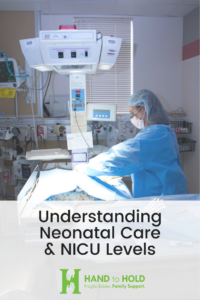You’ve entered the world of preemie parenthood, and suddenly it’s a whole new ballgame in which you didn’t plan to play. There are rules, lights, sounds, and lots of talks that might seem foreign to you. When parenting a preemie, learning all about the neonatal intensive care unit (NICU) and what NICU levels mean can help you feel more aware and in charge of your baby’s care.
What is a NICU?
A NICU is an intensive care unit where medical professionals will care for babies born early, those with medical complications during delivery, or who develop medical problems later and require a higher level of care than a typical hospital nursery. All NICUs care for babies with extra needs, but NICU levels and levels of care can vary between hospitals. Some hospitals can only provide care for healthy full-term babies and must transfer preemie or sick babies to other facilities that are equipped to handle more extensive medical needs.
What are the levels of NICU care available for my baby?
 Level I – Basic Newborn Care
Level I – Basic Newborn Care
Level I nurseries, sometimes called a “Well Newborn Nursery,” provides care for healthy full-term babies or babies born close to their due date (usually 35 weeks or later). These nurseries offer routine care, including assessments, and are equipped to stabilize babies and get them ready for transport to facilities that provide higher levels of care if needed.
Level II – Special Newborn Care
Level II nurseries treat babies born greater than 32 weeks or those that are full-term and require close monitoring of problems that are expected to resolve soon. These facilities can treat babies with some medical difficulties due to prematurity, such as jaundice, trouble maintaining body temperature, or feeding issues.
Special Care (Level II) Nurseries are further broken down into Level 2A and Level 2B based on the type of respiratory support offered:
- Level IIA: These nurseries do not provide any level of respiratory assistance.
- Level IIB: These nurseries can provide some respiratory assistance (CPAP or mechanical ventilation) for short periods of time, usually less than 24 hours.
Level III – Subspecialty Newborn Care
Level III nurseries care for the very tiny and very sick newborns. These units have a wide variety of staff available 24 hours a day and are equipped to provide continuous life support and critical medical and surgical care.
Level III nurseries can be further divided based on the facility’s capability to provide advanced care.
- Level IIIA: These units care for babies born greater than 28 weeks’ gestation. Level IIIA nurseries offer mechanical ventilation and minor surgical procedures.
- Level IIIB: Level IIIB nurseries provide comprehensive care for the youngest babies born at 28 weeks or fewer or birth weight of 1,000 grams or less. These units offer advanced ventilation and some surgeries that may require anesthesia.
Level IV – Regional NICU (sometimes called Level IIIC)
A Level IV NICU is the highest level of NICU care and is often a regional facility with on-site surgical capabilities for the most severe medical conditions. Level IV nurseries care for babies at the lowest age of viability or micro preemies. These units provide the most sophisticated respiratory support and offer a wide variety of neonatal surgeries.
How can I feel supported during my baby’s NICU stay?
There are very few things less stressful than having a baby in the NICU, regardless of what level facility in which they are staying. Learning a little bit about the various levels of intensive care nurseries and which type your baby is in may help make the experience less frightening and allow you to focus your efforts on your baby’s progress and care.
Hand to Hold provides provides personalized emotional support, educational resources and community before, during and after a NICU stay. Learn more about our resources for NICU parents, contact us toll-free at 855.424.6428 ext. 715, or at info@handtohold.org.
About Hand to Hold:
Hand to Hold® is a national nonprofit 501(c)(3) that provides personalized emotional support, educational resources and community before, during and after a NICU stay. Hand to Hold is removing barriers for support by growing a hybrid model of in-person and virtual support in service to our mission. Support is provided to parents at no cost to families and all support is designed with the emotional, physical and social needs of the NICU parent. For more information, visit http://www.handtohold.org

